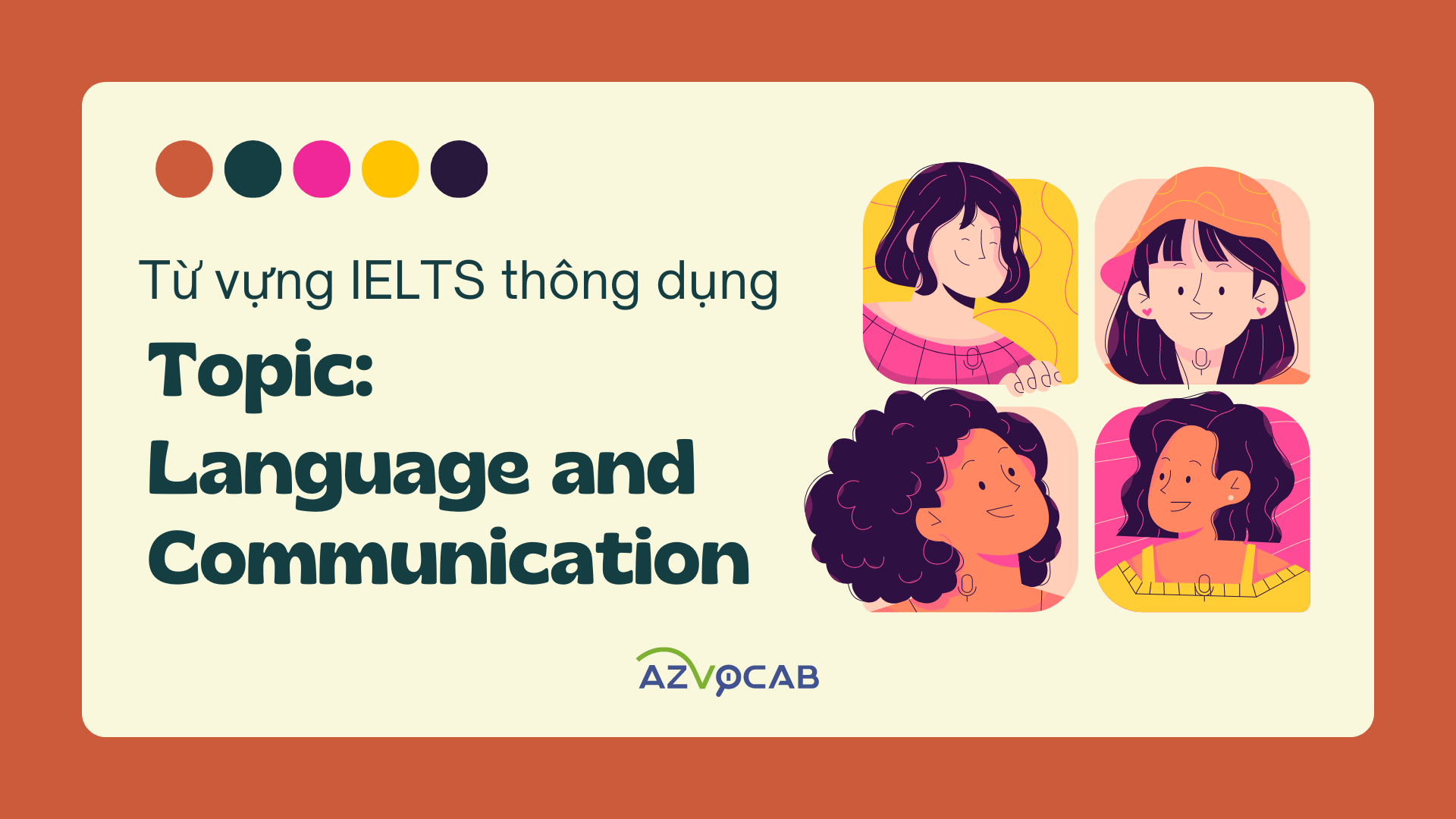Tổng hợp từ vựng chủ đề Language and communication thông dụng cho kì thi IELTS
24 November, 2022Từ vựng IELTS theo chủ đề

Từ những bộ sách hay nhất cho việc ôn thi IELTS, azVocab đã tổng hợp được hơn 40 từ vựng phổ biến nhất thuộc chủ đề Language and communication cho kì thi IELTS.
Các từ vựng này đều có thể sử dụng cho cả 4 kỹ năng Reading, Listening, Speaking và Writing. Những ví dụ được azVocab lựa chọn kĩ lưỡng trong từng ngữ cảnh cụ thể ở các bài thi IELTS. Điều này sẽ giúp các bạn biết cách sử dụng từ trong ngữ cảnh, tăng tính hiệu quả của việc học từ.
1. Từ vựng về một số khái niệm ngôn ngữ học và sự phát triển của ngôn ngữ
| accuracy (n.) – sự chính xác | I learned that communication was more important than accuracy. |
| concept (n.) – khái niệm | Concepts that an older signer uses a single sign for, such as rolling and falling, have been unpacked into separate signs by youngsters. |
| fluency (n.) – sự trôi chảy | Fluency is what helps you to function properly – it’s what helps you get a job, hold a conversation or just buy the things you need. |
| linguist (n.) – nhà ngôn ngữ | Linguists believe that deaf children are born with the ability to link gestures to meaning. |
| linguistics (n.) – ngôn ngữ học | Modern linguistics emerged as a distinct field in the nineteenth century. |
| pronunciation (n.) – cách phát âm; sự phát âm | I didn’t really have a problem with pronunciation like the other kids in my class. |
| vocabulary (n.) – từ vựng | Every week our Spanish teacher gives us a list of vocabulary to learn. |
| inherent (adj.) – vốn có | What intrigues the linguists is that, for sign language to emerge spontaneously, deaf children must have some inherent tendency to link gestures to meaning. |
| arise (v.) – xuất hiện, nổi lên | There are over 6,000 different languages today, and the main language families are thought to have arisen as modern humans wandered about the globe in four great migrations beginning 100,000 years ago. |
| colonise (v.) – chiếm làm thuộc địa | How could our speechless Homo sapiens ancestors colonise the ancient world, spreading from Africa to Asia, and perhaps making a short sea crossing to Indonesia, without language? |
| emerge (v.) – nổi lên, hiện ra | The language emerged in the late 1970s, at a new school for deaf children. |
| evolve (v.) – phát triển, thay đổi từ từ | There are over 6,000 different languages today, but how did language evolve in the first place? |
| unprecedented (adj.) – chưa từng xảy ra, chưa từng có tiền lệ | In fact, research indicates that languages are dying out at an unprecedented rate. |
| signify (v.) – biểu thị, biểu hiện; nghĩa là | Nobody really knows what the marks on the ancient stones signify. |
| pronounce (v.) – phát âm | The individual sounds are very strange to other nationalities and often difficult for them to pronounce. |
2. Từ vựng về loại hình ngôn ngữ và đối tượng giao tiếp
| dialect (n.) – phương ngữ; tiếng địa phương | Just as biologists rarely see a new species arise, linguists rarely get to discover an unknown dialect or even better, to see a new language being born. |
| gesture (n.) – cử chỉ | In spoken language these units are words; in sign language these units are gestures. |
| language (n.) – ngôn ngữ | Academics have been able to follow the formation of a new language in Nicaragua. |
| mother tongue (n.) – tiếng mẹ đẻ | I can speak three languages fluently, but Italian is my mother tongue. |
| native speaker (n.) – người bản ngữ | You also need to speak to native speakers of the language as much as you can. |
| sign language (n.) – ngôn ngữ kí hiệu | The catch is that it is not a spoken language but, rather, a sign language which arose spontaneously in deaf children. |
3. Từ vựng về giao tiếp
| communication (n.) – sự giao tiếp | Marc Hauser (Harvard University) and colleagues argue that the study of animal behaviour and communication can teach us how the faculty of language in the narrow human sense evolved. |
| hesitation (n.) – sự do dự, ngập ngừng; sự nói ngắc ngứ, sự nói ấp úng | He has the ability to speak without hesitation because he has practiced regularly. |
| impressive (adj.) – ấn tượng | She has an impressive command of the English language. |
| incoherent (adj.) – rời rạc, không mạch lạc | The talk she gave was incoherent and badly prepared. |
| one-to-one (adj.) – một-một | Authors distinguish advertising from salesmanship by defining it as mediated persuasion aimed at an audience rather than one-to-one communication with a potential customer. |
| reliable (adj.) – uy tín, có thể tin được | Current reliable figures on the incidence of plagiarism are surprisingly scarce, perhaps because universities are loath to reveal them. |
| sophisticated (adj.) – phức tạp; tinh vi | Evershed suggests that the Ancient Egyptians had surprisingly sophisticated knowledge of how to use various preservatives. |
| spontaneous (adj.) – tự phát; tự nhiên, không gò bó | I am certain both these statements were spontaneous and genuine. |
| communicate (v.) – giao tiếp, liên lạc | In his own management style, he certainly seems to communicate well with his team and holds regular meetings. |
| comprehend (v.) – hiểu, lĩnh hội | The infinite distances of space are too great for the human mind to comprehend. |
| clarify (v.) – làm rõ | The Foreign Secretary’s remarks clarify an ambiguous statement issued earlier this week. |
| converse (v.) – trò chuyện | Dr Senghas showed this by asking signers of different ages to converse about a set of photographs that each could see. |
| define (v.) – giải thích | Your essay is good, but you need to define the causes of pollution more clearly. |
| demonstrate (v.) – chứng minh, giải thích, bày tỏ | The students demonstrated a good knowledge of fundamental principles. |
| distinguish (v.) – phân biệt | Early users did not develop a way of distinguishing left from right. |
| explain (v.) – giải thích | Teachers also need to be able to explain things clearly and in a way that is easy to follow. |
| gesture (v.) – ra hiệu | When he asked where the children were, she gestured vaguely in the direction of the beach. |
| illustrate (v.) – minh họa | They mentioned the term to illustrate the type of communication needs faced by early man. |
| imply (v.) – ngụ ý, hàm ý | She was upset by the implied criticism. |
| indicate (v.) – chỉ ra, cho biết; biểu lộ | Nor could their younger partners teach them the signs that indicate left and right. |
| recall (v.) – nhớ lại | She recalled seeing a work by Robert Rauschenberg that had been damaged and then meticulously restored. |
| stutter (v.) – nói lắp, cà lăm | She stutters a little, so be patient and let her finish what she’s saying. |
| suggest (v.) – gợi ý, đề nghị | Dean Falk (Florida State University) suggests that, before the first smattering of language there was motherese, that musical gurgling between a mother and her baby, along with a lot of eye contact and touching. |
| translate (v.) – dịch | I could produce essays and translate eighteenth-century texts without much difficulty and I actually enjoyed learning the grammar rules. |
| refer to (phr.v) – nói về, đề cập đến | The other had to guess which photograph he was referring to. |
Những từ vựng thông dụng về chủ đề Language and communication hy vọng sẽ giúp bạn ôn tập tốt hơn cho kì thi IELTS và đạt được kết quả cao nhất. Hãy tiếp tục đón xem những bài viết về từ vựng thông dụng ở các chủ đề khác cho kì thi IELTS tại bài viết tổng hợp 18 chủ đề từ vựng thường gặp nhé!





